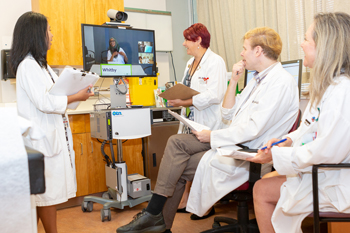Home is where the care is

By Emily Dawson

The TPN team simulates a telemedicine appointment within its clinic at St. Michael’s. Patients can attend the clinic in-person or remotely via telemedicine. (Photo by Yuri Markarov)
For Trudy Porretta, who lives with Short Bowel Syndrome (SBS) and several other complex conditions, St. Michael’s Home Total Parenteral Nutrition (TPN) clinic is a “godsend.”
A well-balanced diet contains all the nutrients we need to function properly. The food we eat breaks down in our stomach and travels into our bowels. For most people, the bowels absorb the nutrients, and carry them to the rest of our body.
Porretta’s SBS prevents the proper absorption of nutrients. Thankfully, there’s an alternative for her and others with digestive conditions: parenteral nutrition, a special liquid diet given through an intravenous (IV) catheter.
One of the greatest benefits of parenteral nutrition is that people can self-manage their IV from the comfort of home, but patients require frequent monitoring to ensure everything stays on track.
St. Michael’s TPN clinic has the capacity to extend care to people living outside Toronto via telemedicine. Facilitated by the St. Michael’s Telemedicine Program, patients can remotely connect with the clinic’s physician, Dr. Khursheed Jeejeebhoy, and the rest of the inter-professional team for appointments without having to travel to the city.
Porretta lives in Barrie, and although she has a car, she relies on public transportation to get to medical appointments in Toronto.
“Telemedicine improves the efficiency of health-care delivery and makes sure patients have easy access to a team of specialists, despite geographic barriers.” – Dr. Khursheed Jeejeebhoy, Telemedicine Program physician |
“It would be very hard to get to the clinic, especially in the winter,” she said. “I have only one lung, and that really affects my breathing on cold days. This technology is a godsend.
“Everyone on the team is wonderful. I feel just as welcomed and well cared for using telemedicine as I do in the clinic.”
Dr. Jeejeebhoy is a proponent of leveraging this technology as much as possible.
“Telemedicine improves the efficiency of health-care delivery and makes sure patients have easy access to a team of specialists, despite geographic barriers,” said Dr. Jeejeebhoy. “We can do almost everything virtually that we can do physically in the clinic.”
While the patient must go to a local telemedicine site to access the technology, it’s far simpler than the long trip to Toronto for Porretta.
“What used to take me a full day can now be done in a few hours.”
As a member of the Ontario Telemedicine Network (OTN), St. Michael’s physicians and staff have access to a secure network infrastructure that links to telemedicine/videoconferencing sites across Ontario to deliver care.
About St. Michael’s Hospital
St. Michael’s Hospital provides compassionate care to all who enter its doors. The hospital also provides outstanding medical education to future health care professionals in more than 29 academic disciplines. Critical care and trauma, heart disease, neurosurgery, diabetes, cancer care, care of the homeless and global health are among the Hospital’s recognized areas of expertise. Through the Keenan Research Centre and the Li Ka Shing International Healthcare Education Centre, which make up the Li Ka Shing Knowledge Institute, research and education at St. Michael’s Hospital are recognized and make an impact around the world. Founded in 1892, the hospital is fully affiliated with the University of Toronto.
St. Michael’s Hospital with Providence Healthcare and St. Joseph’s Health Centre now operate under one corporate entity as of August 1, 2017. United, the three organizations serve patients, residents and clients across the full spectrum of care, spanning primary care, secondary community care, tertiary and quaternary care services to post-acute through rehabilitation, palliative care and long-term care, while investing in world-class research and education.
